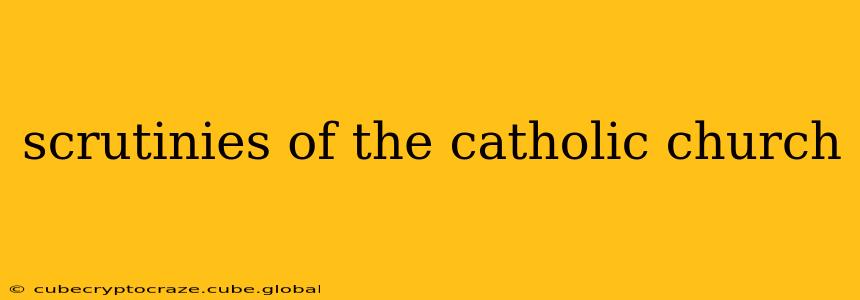The Catholic Church, one of the world's oldest and largest institutions, has throughout its history been subject to various scrutinies. These range from theological debates and internal reforms to external criticisms concerning its social, political, and moral stances. Understanding these scrutinies provides valuable insight into the Church's evolution and its ongoing relationship with the world.
What are the main criticisms of the Catholic Church?
The Catholic Church faces a wide array of criticisms, often overlapping and interconnected. Some of the most prominent include:
-
Historical Actions: The Church's historical involvement in events such as the Crusades, the Inquisition, and the suppression of scientific inquiry are frequently cited as evidence of morally questionable actions. Critics argue that these events demonstrate a willingness to utilize power for purposes that contradict its teachings of love and compassion.
-
Treatment of Women: The Church's traditional hierarchical structure, its restrictions on women's roles in the priesthood and decision-making processes, and its historical stances on issues such as reproductive rights draw significant criticism. Many argue that these policies are discriminatory and perpetuate gender inequality.
-
Handling of Sexual Abuse Cases: The widespread and long-standing cover-up of sexual abuse by clergy has arguably been the most damaging criticism in recent decades. The scale of the abuse, the institutional response (or lack thereof), and the resulting suffering of victims have severely undermined public trust.
-
Dogma and Tradition: Certain aspects of Catholic doctrine and tradition, such as the prohibition of contraception, same-sex marriage, and the ordination of women, are subject to intense debate and criticism, particularly from those who advocate for greater inclusivity and social justice.
-
Political Influence: The Church's historical and ongoing influence on political matters, particularly in some countries, has led to accusations of interference in governance and the promotion of specific agendas.
What are the major scandals facing the Catholic Church?
Major scandals, often intertwined with the criticisms mentioned above, have significantly impacted the Church's public image and internal dynamics. The most prominent include:
-
Sexual Abuse Crisis: This ongoing crisis, involving widespread allegations of sexual abuse of children and vulnerable adults by clergy, has resulted in numerous lawsuits, criminal investigations, and calls for significant reforms.
-
Financial Scandals: Several instances of financial mismanagement and alleged corruption within the Vatican and dioceses worldwide have raised concerns about transparency and accountability.
-
Cover-ups and Lack of Transparency: The systematic attempts to conceal or downplay instances of abuse and wrongdoing have fueled distrust and anger among victims, the public, and even some within the Church.
How does the Catholic Church respond to criticism?
The Church's responses to criticism have varied across time and specific issues. In recent years, there's been a greater emphasis on:
-
Acknowledging Past Wrongs: While acknowledging past wrongs remains a complex and ongoing process, there's a growing recognition of the need to address historical injustices and offer sincere apologies to victims.
-
Internal Reform Efforts: The Church has undertaken various initiatives aimed at improving accountability, transparency, and the prevention of future abuses, such as enhanced background checks, stricter reporting procedures, and increased training for clergy.
-
Engagement in Dialogue: There is a growing willingness within certain sectors of the Church to engage in dialogue with critics, seeking to address concerns and find common ground. However, this dialogue is often characterized by differing interpretations of doctrine and tradition.
How has the Catholic Church changed over time?
The Catholic Church has undergone significant transformations throughout its history. While its core doctrines remain central, its practices and interpretations have evolved in response to societal changes, scientific advancements, and internal debates. This evolution is often a source of both progress and tension within the Church.
What is the future of the Catholic Church?
The future of the Catholic Church is complex and uncertain. The ongoing impact of scandals, demographic shifts, evolving social attitudes, and internal tensions presents significant challenges. However, the Church's global presence, its enduring appeal to many, and its ongoing efforts at reform suggest a capacity for adaptation and renewal. The extent and nature of this adaptation will be a key determinant of the Church's future trajectory.
This exploration of scrutinies facing the Catholic Church aims to provide a balanced and informed overview of a complex and multifaceted institution. It's essential to acknowledge the diversity of viewpoints within the Church itself and to recognize the ongoing nature of this dialogue.
